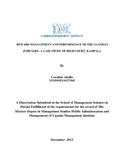| dc.description.abstract | The study was conducted to find out the effects of reward management on the performance of
the Ugandan Judiciary using a case study of High Court at Kampala, specifically, how reward
policies affect performance of the Judiciary, the effects of total reward on performance of the
Judiciary and the effects of reward processes on performance of the Judiciary. The study adopted
a case study design using both quantitative and qualitative methods. The findings indicated that
Judiciary neither had a reward policy nor reward system in place. It did not also have a system in
place to appraise the Judges and the appraisal system in place was not properly understood and
adhered to. The correlation analysis indicated there was positive and significant relationship
between reward management and performance of the Ugandan Judiciary and the regression
analysis indicated that reward management explained up to 36% of performance of the Judiciary.
The study concluded that reward policies should be based on the principles of equity,
consistency, transparency, taking into consideration the market rates. The study also concluded
that in providing rewards extrinsic factors should be considered before considering to
intrinsically reward employees. And finally that rewards need to be tied to a performance
management programme that encompasses the mission, vision and goals of the organization. The
study recommends that the Judiciary should set up a reward policy based on the principles of
equity, consistency and transparency, considering market rates; the Judiciary formulates a reward
strategy that facilitates recognition of employees by both financial and non financial means; that
the Judiciary should set up a performance management mechanism as an assessment tool in the
reward process that clarifies standards and expectations in line with the vision, mission and
objectives of the organization and focuses on the achievement of results to facilitate the
assessment of individual performance and provision of rewards where they are due. | en_US |

